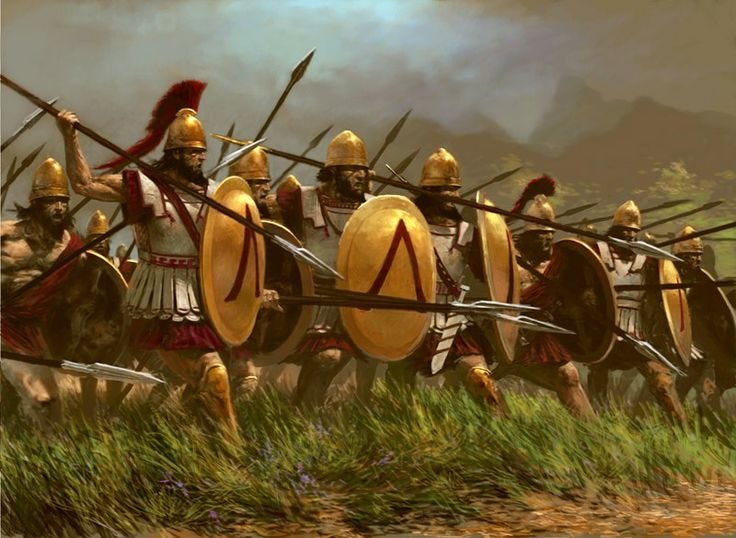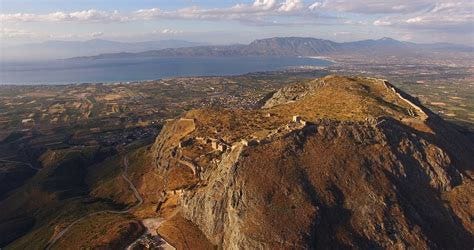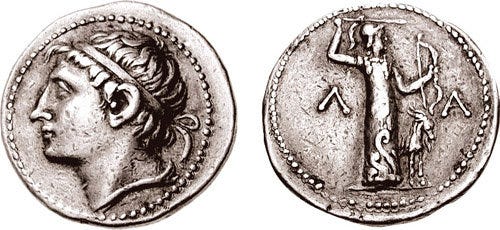The Sparta You've Never Heard About - Part II
The revolution of Cleomenes III [with lessons for (professional) historians in the footnotes].
…Continued from Part I
The Revolution of Cleomenes III (235-222 BC)
Not long after Agis IV got murdered, Leonidas II forced his own son Cleomenes and Agis’ widow Agiatis into marriage. Agiatis obviously hated Leonidas, who nonetheless wanted his son married to the wealthy heiress. The twice queen of Sparta has been called “the most beautiful woman in Greece at the time” and she was at least a couple of years older than Cleomenes, who was probably a teenager in 241 BC. She likely played an important role in the young Agiad1 heir’s decision to continue Agis’ reforms. Despite their forced marriage, the two appear to have been really close to each other.
Cleomenes III became king of Sparta in 235 BC. The Sparta Cleomenes inherited is described as being in a sorry state. The rich were absorbed by hedonism, while the poor were only trying to make ends meet, afraid to speak of their desires since Agis’ murder. Cleomenes’ own power paled in comparison to that of the Ephors. Almost nobody in Sparta seemed to be in shape for war, while the Achaean League was making gains in nearby Arcadia and all over the Peloponnese. As proper oligarchs, the Achaean leaders were concerned that potential success of land reforms in Sparta could lead to similar demands by their own people. Aratus of Sicyon, frequent general and foremost politician of the Achaean League, was to become Cleomenes’ main antagonist in the struggle to unify the Peloponnese.
In 243 BC Aratus had captured the Macedonian-held fortress of Acrocorinth, one of the great strongholds of Ancient Greece2, with a night attack during peace time. By 229 BC much of the Peloponnese had willingly joined - or was forced into - the Achaean League and Aratus was harassing the Arcadian cities3. The Ephors sent Cleomenes to seize and improve a border fort in Arcadia. After Aratus’ supporters failed to betray some Arcadian cities to him4, Cleomenes was recalled, but as Achaean aggression continued, he was soon sent back with 5000 soldiers. The Achaeans retreated, even though they outnumbered the Spartans 4 to 1. Encouraged by this success, Cleomenes became bolder; in 227 BC at Mount Lycaeum, he surprised and shattered Aratus’ force while the later was pressuring Elis, a Spartan ally. Aratus, however, in the ensuing chaos, managed to capture the important city of Mantineia in Arcadia, reducing Cleomenes’ popularity in Sparta along with support for the war effort.
Cleomenes though was far more cunning than the perhaps idealist Agis. He bribed the Ephors to allow him a new expedition and with the help of his mother Cratesiclea and stepfather Megistonous gained further support. The Achaeans were soon bested again at the Battle of Ladoceia, near Megalopolis. With his popularity increasing, Cleomenes decided the time was ripe to plot against his domestic rivals. He deployed most of them in the following campaign in Arcadia and had the army march around ceaselessly to the point of exhaustion. The Spartans requested to rest and Cleomenes eagerly agreed; he returned to Sparta only with his friends and mercenaries and sent men to murder the Ephors. He then exiled eighty of his opponents. The path for his reforms was now open.
In front of the citizen assembly, Cleomenes claimed that the Ephors were not instituted by Lycurgus, but much later; their corruption and power only growing with time. Sparta had to return to the virtues of old and all that stuff. He was only working for the salvation of Sparta and was now to cancel all debts and redistribute the land. Furthermore, the best of the foreigners are to be granted Spartan citizenship, so that Sparta is no more the unprotected booty of Aetolian and Illyrian raiders, through lack of men to defend her.
Cleomenes then placed his own property at the common stock; his supporters and the rest of the citizens followed. 4000 equal plots of land where granted to old and new Spartans, Peroikioi, mercenaries and former exiles. He assigned a plot of land even to the people he had exiled, promising to accept them back once things settle down. The Agoge was re-instituted and the new citizen-soldier body was trained to fight in the Macedonian fashion, as pikemen now instead of hoplites. He then went on to make his own brother co-ruler, in part appearing to uphold the tradition of diarchy.

In 226 BC Mantineia called for aid and the Spartans soon expelled the Achaean garrison. After more campaigns in Arcadia, Cleomenes invaded Achaea proper and crushed the main Achaean army at Dyme. The Achaeans were desperate and seriously considered Cleomenes terms; he would return war prisoners and captured cities if they made him leader of the League5. Aratus though had another opinion. He entered secret negotiations with Macedon, offering to return the stronghold of Acrocorinth if they would help him defeat Cleomenes.
I shall now take a break to talk about the cursed sources:
Not “academic enough” Plutarch (at times sane, balanced, boring, overdramatic and fun)
VS
Extremely Pro-Aratus Polybius (extremely boring Achaean politician turned Scipio family asset) & Wikipedia (modern form of Polybius with disingenuous pretensions of neutrality and loads of errors).6
Anyway…
Aratus was stalling the negotiations until Cleomenes got bored and declared war once again. By now, many poor Achaeans wanted their land reform. Cleomenes was able to capture or win over several cities, including Argos, the arch-rival of old that had never been on the Spartan side. Cleomenes was invited to Corinth, winning over many other cities on his way there. The Achaean garrison of Acrocorinth refused to surrender the fort, even when bribes were proposed. Aratus sent his son and others as hostages to the Macedonian king Antigonus III “Doson”, who agreed to attack the Spartans. Cleomenes maintained the siege of Acrocorinth and also trapped Aratus in Sicyon. Aratus though managed to escape a few months later and soon joined Antigonus.
Learning of Antigonus advancing from Macedon with a formidable force, Cleomenes fortified the Oneian hills near the Isthmus of Corinth. The Macedonian phalanx was more numerous and perhaps better trained than the newly formed Spartan one; certainly it had surpassed the fearsome reputation of Spartan hoplites since the days of Philip II and Alexander7. The fortifications neutered this psychological and numerical disadvantage and Antigonus’ men were forced back suffering heavy casualties. It was another event though that caused Cleomenes to lose much ground, quickly as he had gained it.
The Argives were impatient for reforms, but Cleomenes, either busy with war or not interested, had not pushed for any outside of Sparta. Pro-Achaean Argives reached the Macedonian camp and offered to betray the city, claiming that the people would cooperate, their expectations of Cleomenes not being met. Aratus sailed to Argos with 1500 Antigonid soldiers. Achaean troops from Sicyon and the Argives were already besieging Cleomenes’ men in the acropolis. Megistonous, being the one who had assured Cleomenes of Argive loyalties, was tasked to salvage the situation. The Spartan detachment was unable to reach the trapped garrison and Megistonous was killed in the process. Cleomenes, in fear of being cut off from Sparta, left his strong position and came to the rescue. With the Macedonians approaching, the combined Spartan forces made their retreat to Arcadia. There, Cleomenes learned that his beloved wife Agiatis had died.
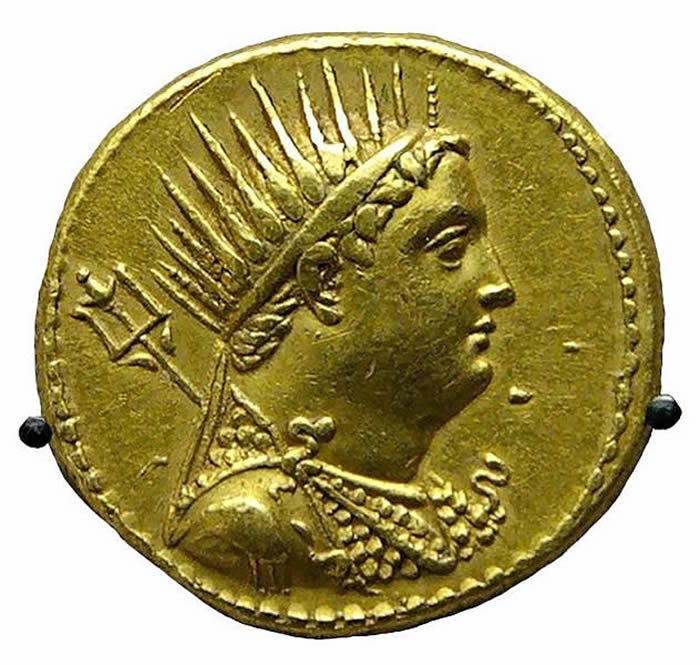
Possibly around this time, Ptolemy III of Egypt - and rival of Antigonus - offered to switch his support from Achaea to Sparta. Cleomenes hesitated, since Ptolemy demanded his mother and children as hostages, but Cratesiclea eagerly volunteered to help her son8. Once in Egypt, Cratesiclea sent a letter to Cleomenes informing him that Ptolemy was in negotiations with Antigonus; he should do what is best for Sparta instead of worrying for her and her grandchildren’s lives. It is unclear how much financial support Cleomenes got from Egypt, but it is most likely that Antigonid diplomacy was soon successful in isolating Sparta.9
Antigonus went on to revive the old Hellenic League of Philip II. Many states were included: Macedon, Achaea, Boeotia, Thessaly, Phocis, Locris, Acarnania, Euboea, and Epirus. In 223 BC he advanced and assaulted Tegea and then captured the other Arcadian cities still loyal to Cleomenes. The Spartans were confined back to Laconia, with half of Greece bearing down on them. Antigonus then sent his levies back home for the winter10 and returned to Achaea to report on his operations. Cleomenes, vastly outnumbered, freed 2000 (or 6000) Helots - those who could pay for their freedom - and had them too trained as pikemen. Thus he also earned some extra coin for mercenary paychecks.
Cleomenes then went on to attack Megalopolis, the only major Arcadian city clearly loyal to Achaea and Macedon. Concealing his movements, he unexpectedly arrived and seized an undefended portion of the city’s walls. Most Megalopolitans fled without a fight; later Cleomenes offered back their city in exchange for an alliance. When they declined the proposal, the Spartans looted Megalopolis and destroyed large parts of it. A daring Spartan raid at Argos followed, and Antigonus - with most of his army still wintering in Macedon - didn’t risk a battle to protect the Argive crops. Cleomenes continued with a display of force in Arcadia, encouraging his local sympathizers.
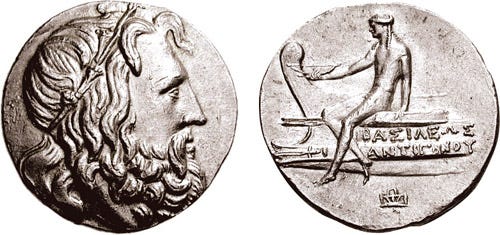
The following summer, Antigonus called in his Macedonians and allies for a major campaign. Cleomenes had to be faced in a pitched battle, for his movements caused much trouble and proved hard to predict. The war was concluded at Sellasia, just north of Sparta, in 222 BC. Antigonus commanded roughly 30000 soldiers and faced the 20000 Cleomenes was able to muster. In the end the Spartans broke, after inflicting heavy casualties and fighting almost to the last man. Had the battle been delayed for a couple of days, the course of history would have been different, for Antigonus received news of the Dardanians11 pillaging Macedon and rushed home.
Cleomenes - with 200 Spartans12 and a few thousand of the others - escaped to Sparta and urged the citizens to accept Antigonus’ terms13. Then he and his friends set sail and fled to Egypt. Ptolemy III reportedly came to respect his direct and incorruptible character and promised to send him back to Sparta with troops, ships and money; but that very same year the Pharaoh died. His successor, Ptolemy IV, was constantly absorbed in palace pleasures, while many Ptolemaic courtiers became hostile to Cleomenes. When he finally requested his return to Sparta even without receiving help, he was forced to stay; soon he was plotted against and placed in house arrest. Cleomenes and his friends eventually managed to break free and attempted to incite a revolt in Alexandria. Having failed, they committed suicide to avoid arrest. The murders of Cratesiclea, her grandchildren and her followers by the Pharaoh’s servants concluded this chapter of Spartan history.
“The man who despairs in the face of difficulties and hardships, or of public censure and opinion, is defeated by his own feebleness.” - attributed to Cleomenes III by Plutarch.
To be continued… (Part III)
On Agiads, Agis, Agiatis:
Agiads = Royal Dynasty of Cleomenes III and Leonidas II
Eurypontids = Royal Dynasty of Agis IV
Agiatis = Wife of Agis, then of Cleomenes
“The fetters of Hellas” - Acrocorinth, Chalkis and Demetrias - were of vital importance for aspiring dominators of Greece.
Polybius, trying to justify Achaean intervention in Arcadia, claims that Cleomenes had seized Tegea, Mantineia, Caphyae, and Orchomenus - previously allied to the Aetolians - by treachery. This seems impossible because the Aetolians aren’t hostile to Sparta the following years and those cities remain pro-Spartan and anti-Achaean throughout the war.
Plutarch mentions a supposed exchange of letters during this pre-war affair, going more or less like:
Cleomenes - "Friend, where are you marching to during the night?" Aratus - "I'm coming to prevent you from fortifing Belbina." Cleomenes - "It makes sense, but all those torches and ladders, if they are yours, what are they for?" That equipment would have been used for Aratus' entry in the Arcadian cities he planned to take during the night, and Aratus, receiving that letter, burst out laughing and asked his followers: "What manner of youth is this?" To which a Spartan exile among them replied: "If you have designs upon the Spartans, make haste, before this young cock grows his spurs."
By which he probably meant leader of the Achaean League for life, as a normal one-year term would have been a rather dumb request, being in a position of strength.
I’m aware of other sources, just took the chance to make a point. I know most people by now don’t trust wickedpedia, but Polybius still has a good yet undeserved reputation. He’s an a-hole in general, not just biased in Achaea vs Sparta (and other Achaean rivals) as it is often claimed.
The propagandistic myth of Spartan invincibility in pitched battles was already shattered by the Theban forces since the 370s BC.
Cratesiclea was also the foreign queen of Leonidas II, and the pretext for his temporary deposition by Agis IV. The two were married at the Seleucid court and she was either a Persian or Macedonian-Persian noblewoman, perhaps even a daughter of Seleucus I*. In any case this makes Cleomenes part Persian through his mother, which is rather interesting.
Perhaps more interesting is that this whole affair implies improved Seleucid-Spartan relations during Leonidas’ reign. Correlates with Sparta’s decline over the pre-Cleo III decades.
Sparta was allied to Ptolemaic Egypt during most of the early Hellenistic period and received Pharaonic aid to put pressure on Macedon. A shift of Sparta towards the Seleucids during Leonidas’ reign makes a lot of sense:
Pharaoh starts supporting Achaea instead of Sparta (see also next note), because Sparta shifts towards the Seleucids (Leonidas has ties). The opposite order is also possible.
The Seleucids are soon plagued by dynastic war, Pharaoh’s proxies and Pharaoh’s invasion during this period, which means no outside help for Sparta. Explains (at least partly) the Spartan low point and attempts at reforms (Also: Sparta approached Pharaoh’s Achaean new darling Aratus and Agis IV and his faction tried to throw pro-Seleucid Leonidas II out).
*Cratesiclea as daughter of Seleucus makes her an excellent hostage for Pharaoh (see also next note).
I tend to respect Plutarch over (superbiasedly boring - or dare I say- intentionally dishonest) Polybius on the whole proxy war thing.
Makes much more sense if Pharaoh flirts with Sparta only after he learns that Aratus cheats on him with Big Mac (perhaps by the time Big Mac marches south). Smart Mac(edon) knows this could happen and instantly texts Pharaoh to stay away from Sparta.
Pharaoh even asks Sparta for important hostages, just to provide (small by pharaonic standards, and per Sparta troop count) coin. This is extreme by any previous standards and proves no lengthy conspiracy against crybaby Achaea (more likely shows Pharaoh trying to puppeteer a desperate Sparta). Likely Sparta got a little Pharaoh coin for a year or two; after Achaea got the Big Mac royal army and after Achaea got a little Pharaoh coin for many a year. Meanwhile Poly has heroic little Achaea fighting by its own strength out of choice and supreme ethics. Then Aratus is moralistically excused for calling in the Big Mac. Face it Poly, Aratus is more of an oligarch schemer than a warchief. Polybian moron crybaby Achaea (with at least triple manpower & wealth plus “Hegemon of Achaea” Pharaoh’s coin) got asskicked before cheating with Big Mac. In part cause Aratus’ minions wanted their land reform too.
Achaean meteoric rise and Spartan decline over the (20 or so) pre-rise-of-Cleo III years also suggests that Pharaoh (had) already stopped his early Hellenistic affair with Sparta by the time Aratus violated Acrocorinth. Aratus was sexy having the big shiny fort keeping Macedon out and Pharaoh loved that, if he wasn’t the one that coined the whole Achaea stronk thing into existence. Sparta - already weak and rather isolated at the start of Agis IV reign, not an Achaea hater as Poly suggests - even tried to charm Aratus (and Pharaoh?) by co-bullying Aetolian bullies, but it didn’t go well. Some years later Aratus fucks up, and trying to float he cheats on Pharaoh by gifting the big shiny fort to Pharaoh’s rival (Big Mac, who unlike Pharaoh can - and wants to - quickly join in with a large army). But Poly et al. go crybaby for Pharaoh switching sides without even admitting he switched.
Poly is a master of self aware projection. That’s one more reason most academics, idiots and puppeteers love him. I’m starting to think he sucks even more that Plato. I even find Livy more tolerable.
It also makes no sense that Pharaoh coins both Achaea and Sparta at the same time, especially after they start fighting (cause Achaea expansion had almost reached Sparta, not because Sparta randomly hates noble Achaea while having no past rivalries). Pharaoh wants his flirt stronk to keep Big Mac out, not a reckless polyamorous party that invites Big Mac to grow. Maybe Pharaoh can risk flipping after Dyme (226 BC), but Aratus still had the big shiny fort and most of his cities even after field loses. Plutarch implies Aratus still gets Pharaoh coin in 225/224 BC. Pharaoh flipping 224-ish with Big Mac moving south makes more sense. And that’s where Plutarch positions it in his narrative.
Therefore, the series of events that makes the most sense is as follows:
Achaea rises fast from relative obscurity due to Aratus’ schemes, initially at the expense of Macedon, with probably (and likely major) Pharaonic coin from the very beginning. This is pretty standard Pharaoh practice seen elsewhere too.
Sparta responds with reforms to regain military power, to avoid getting overwhelmed by growing Achaea.
When Cleomenes outmatches Aratus while severely outnumbered, the Achaean poor see a champion in Cleomenes and want equal fields and no debt. Achaea destabilized.
Aratus calls in the royal army of Macedon, preferring vassalage to personal defeat (and possible destruction of Achaean oligarchs at the hands of Cleomenes). Macedon, now stronger under Antigonus Doson, is ready to regain ground in the Pelopponese, while Pharaoh is by now weaker than he was when he helped Aratus rise.
Cleomenes gets some Pharaoh coin in exchange for hostages, but soon rising Macedon and pressured Pharaoh strike another deal. Or, Pharaoh actually hates land reforms as much as other powerful folk do and just tricks Cleomenes without actually helping him. The Sparta-Egyptian coins found could easily be from before Cleo and even before Agis IV and Leonidas II (see also previous note).
Ancient wars were rarely fought during winter.
Illyrian or Thraco-Illyrian tribe to the north of Macedon, consistently strong for centuries and likely forming the powerbase of Bardylis’ great Illyrian kingdom (393–358 BC).
Assuming about 6000 Spartan citizen-soldiers (possibly more if more than 2000 helots were freed or even assuming ~4000 if freed Helots didn’t get citizenship), just 200 surviving Sellasia make it perhaps even bolder of a last stand than that of Thermopylae, where only the elite royal guard stayed to fight to death. It is certainly far more impressive than any other Spartan defeat in that regard, and displays great determination and loyalty from Cleomenes’ men.
Antigonus was the first ever conqueror of Sparta, but besides reversing Cleomenes’ reforms he showed generosity and allowed the Spartans to remain independent, perhaps as a counterbalance to Achaean power in the Peloponnese.




